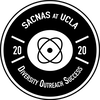Scientific Excellence through Diversity Seminar (SEDS) Series
SEDS are a series of general research seminars that bring highly successful professionals in biomedical, life, and physical science fields to UCLA to give a presentation about their research and meet with students and postdoctoral trainees to discuss how they have succeeded in their careers and contributed to increasing diversity in science.
The seminar series provides opportunities for students, grad students and postdoctoral trainees to get accustomed to engaging in a scientific discussion, as well as discuss important matters such as diversity in science with faculty from all over the nation.
The SEDS series is sponsored by the Graduate Program in Bioscience (GPB) and the David Geffen School of Medicine (DGSOM) at UCLA.
The seminar series provides opportunities for students, grad students and postdoctoral trainees to get accustomed to engaging in a scientific discussion, as well as discuss important matters such as diversity in science with faculty from all over the nation.
The SEDS series is sponsored by the Graduate Program in Bioscience (GPB) and the David Geffen School of Medicine (DGSOM) at UCLA.
SEDS Series Mission:
Highlight and celebrate the importance of diversity in scientific excellence. Provide career development and informal networking opportunities to underrepresented groups on campus.
UCLA Trainees are encouraged to Nominate a Speaker for SEDS:
We highly encourage undergraduates, graduate students and post doctoral trainees to invite a person of their choice to give a seminar, plus lead their visit. It's an opportunity for you to meet them and have it possibly be your next lab!
Criteria for selection:
Speakers must be from a traditionally underrepresented group in STEM (woman, ethnic minority, disabled, LGBT, socioeconomically disadvantaged, etc.) or have a strong record of working to increase diversity in science.
Criteria for selection:
Speakers must be from a traditionally underrepresented group in STEM (woman, ethnic minority, disabled, LGBT, socioeconomically disadvantaged, etc.) or have a strong record of working to increase diversity in science.

